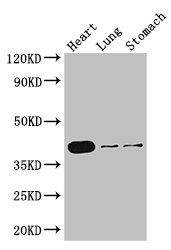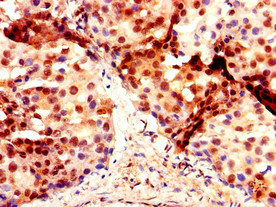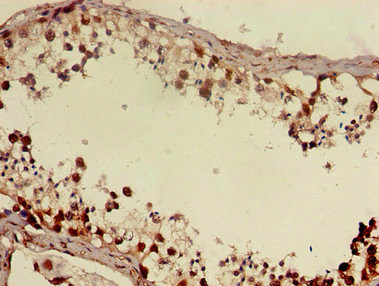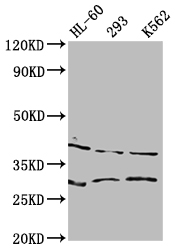Full Product Name
Rabbit anti-Homo sapiens (Human) DMRT1 Polyclonal antibody
Alternative Names
CT154 antibody; DM domain expressed in testis 1 antibody; DM domain expressed in testis protein 1 antibody; DM domain gene expressed in testis antibody; DMRT 1 antibody; dmrt1 antibody; DMRT1_HUMAN antibody; DMT 1 antibody; DMT1 antibody; Doublesex and mab 3 related transcription factor 1 antibody; Doublesex- and mab-3-related transcription factor 1 antibody
Species Reactivity
Human, Mouse
Immunogen
Recombinant Human Doublesex- and mab-3-related transcription factor 1 protein (195-363AA)
Immunogen Species
Homo sapiens (Human)
Conjugate
Non-conjugated
The DMRT1 Antibody (Product code: CSB-PA896914LA01HU) is Non-conjugated. For DMRT1 Antibody with conjugates, please check the following table.
Available Conjugates
| Conjugate |
Product Code |
Product Name |
Application |
| HRP |
CSB-PA896914LB01HU |
DMRT1 Antibody, HRP conjugated |
ELISA |
| FITC |
CSB-PA896914LC01HU |
DMRT1 Antibody, FITC conjugated |
|
| Biotin |
CSB-PA896914LD01HU |
DMRT1 Antibody, Biotin conjugated |
ELISA |
Purification Method
>95%, Protein G purified
Concentration
It differs from different batches. Please contact us to confirm it.
Buffer
Preservative: 0.03% Proclin 300
Constituents: 50% Glycerol, 0.01M PBS, PH 7.4
Tested Applications
ELISA, WB, IHC
Recommended Dilution
| Application |
Recommended Dilution |
| WB |
1:500-1:5000 |
| IHC |
1:20-1:200 |
Storage
Upon receipt, store at -20°C or -80°C. Avoid repeated freeze.
Lead Time
Basically, we can dispatch the products out in 1-3 working days after receiving your orders. Delivery time maybe differs from different purchasing way or location, please kindly consult your local distributors for specific delivery time.
Usage
For Research Use Only. Not for use in diagnostic or therapeutic procedures.










